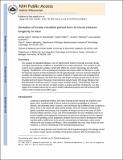Deviation of innate circadian period from 24 hours reduces longevity in mice
Author(s)
Bonkowski, Michael S.; Pointer, Kelli; Pletcher, Scott D.; Libert, Sergiy V.; Guarente, Leonard Pershing
DownloadGuarente_Deviation of innate.pdf (1.549Mb)
OPEN_ACCESS_POLICY
Open Access Policy
Creative Commons Attribution-Noncommercial-Share Alike
Alternative title
Deviation of innate circadian period from 24 h reduces longevity in mice
Terms of use
Metadata
Show full item recordAbstract
The variation of individual life spans, even in highly inbred cohorts of animals and under strictly controlled environmental conditions, is substantial and not well understood. This variation in part could be due to epigenetic variation, which later affects the animal’s physiology and ultimately longevity. Identification of the physiological properties that impact health and life span is crucial for longevity research and the development of anti-aging therapies. Here, we measured individual circadian and metabolic characteristics in a cohort of inbred F1 hybrid mice and correlated these parameters to their life spans. We found that mice with innate circadian periods close to 24 h (revealed during 30 days of housing in total darkness) enjoyed nearly 20% longer life spans than their littermates, which had shorter or longer innate circadian periods. These findings show that maintenance of a 24-h intrinsic circadian period is a positive predictor of longevity. Our data suggest that circadian period may be used to predict individual longevity and that processes that control innate circadian period affect aging.
Date issued
2012-07Department
Massachusetts Institute of Technology. Department of Biology; Paul F. Glenn Center for Biology of Aging Research (Massachusetts Institute of Technology)Journal
Aging Cell
Publisher
Wiley Blackwell
Citation
Libert, Sergiy, Michael S. Bonkowski, Kelli Pointer, Scott D. Pletcher, and Leonard Guarente. “Deviation of innate circadian period from 24 h reduces longevity in mice.” Aging Cell 11, no. 5 (October 12, 2012): 794-800.
Version: Author's final manuscript
ISSN
14749718
1474-9728